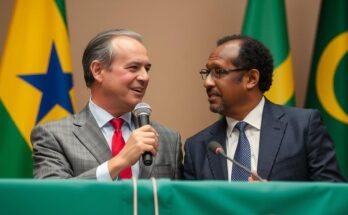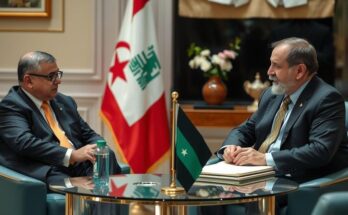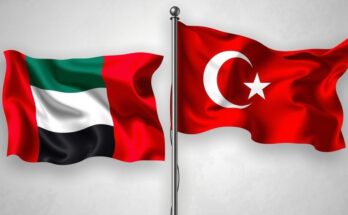This article explores the evolving strategic partnership between Morocco and Mauritania, highlighting the historical roots and contemporary challenges that shape their relationship. It emphasizes the significance of their cooperation in various sectors including security, economic development, and regional integration, especially amidst geopolitical tensions in the Maghreb. The article outlines key initiatives and the importance of infrastructure projects that can foster sustainable development and stabilize the region. Overall, it paints a picture of a model partnership poised to address shared challenges and promote prosperity.
The relationship between Morocco and Mauritania has evolved significantly, especially since the onset of the Western Sahara conflict. Situated strategically between Algeria and Morocco, Mauritania plays an essential role in regional geopolitics and peace efforts, albeit under complex political and economic pressures. Recently, the ties between Rabat and Nouakchott have improved, highlighted by King Mohammed VI’s reception of President Mohamed Ould Ghazouani during an informal visit.
These two nations exemplify the importance of strategic collaboration rooted in a long history of interdependence, focused on security, stability, and developmental growth within North Africa. Their partnership encompasses various dimensions, including cultural, religious, economic, political, and security aspects, creating a robust framework for addressing contemporary challenges and leveraging future opportunities. Security concerns, particularly those regarding terrorism, organized crime, and illegal migration, compel both nations to work closely due to their shared geographical proximities.
Mauritania’s geopolitical positioning—adjacent to Algeria and Morocco—places it in a precarious situation regarding the conflict in the Moroccan Sahara. Despite external pressures, Mauritania has adopted a policy of neutral engagement, participating in initiatives aimed at facilitating economic growth within the region. Joint projects like the gas pipeline from Nigeria to West Africa and the Atlantic Moroccan Initiative illustrate Mauritania’s aspirations for a balanced regional development strategy, while strategically controlling trade routes such as the Guerguerat crossing.
The Moroccan-Mauritanian alignment reflects a commitment to sustainable development and regional integration, with Morocco’s initiative to develop its southern provinces being a focal point. This program, launched under King Mohammed VI’s leadership, seeks to transform these areas into thriving economic hubs linked to Europe and Africa. The Atlantic maritime port of Dakhla is pivotal in enhancing trade connectivity, providing a platform to attract investment and propel regional commerce forward.
From Mauritania’s perspective, this development enhances its economic ties with Morocco, fostering access to global markets. The collaborative environment fostered by existing agreements further stabilizes the geopolitical landscape in the region. This cooperation also extends into security domains, addressing emerging threats and enhancing defense capabilities through military collaboration and regional alliances.
Diplomatic coordination between Morocco and Mauritania in addressing regional and global challenges is crucial. Their partnership addresses fundamental issues concerning peace, security, and development in a climate where the complexities of governance and territorial jurisdiction frequently arise. Such cooperation offers a model for regional dynamics and a framework for tackling shared problems across sectors like green energy, agriculture, and eco-tourism, enhancing economic sustainability and improving quality of life for both populations.
This partnership’s strength lies in its ability to adapt to the ever-evolving geopolitical environment, aiming to create a unified security framework against common threats ranging from arms trafficking to the implications of climate change. By fostering expertise and joint training, both nations can enhance their military readiness and resilience against unforeseen challenges. The combination of their cooperative endeavors heralds a progressive step towards establishing an effective regional security system.
In essence, the Moroccan-Mauritanian relationship signifies a model of strategic collaboration founded on shared interests and common goals. Initiatives like the Atlantic Gas Pipeline reflect both countries’ commitment to stability and economic development, potentially influencing cooperation models across the African continent. However, realizing the full potential of this partnership requires a flexible political approach that fosters economic integration and emphasizes mutual benefits. Significant projects aimed at infrastructural development are essential to shaping a new geopolitical landscape that presents North Africa as a beacon for regional cooperation and prosperity.
The dynamics between Morocco and Mauritania have been influenced by historical, political, and economic factors, particularly in light of the Western Sahara dispute. As tensions mount between Morocco and Algeria, Mauritania’s strategic location uniquely positions it as a critical player in regional diplomacy. Both countries share common security concerns stemming from their geographical proximity, making cooperation necessary for mutual security and development. Understanding the interplay of these elements is vital to analyzing current and future relations between Morocco and Mauritania.
In conclusion, the evolving relationship between Morocco and Mauritania offers a promising landscape for regional cooperation that can significantly impact both countries’ stability and development. With historical ties deeply embedded in their strategic partnership, they must leverage this foundation to cultivate a comprehensive framework that addresses ongoing challenges while promoting mutual interests. Strengthening diplomatic and economic ties could transform North Africa into a model for effective regional collaboration and sustainable growth.
Original Source: moderndiplomacy.eu




